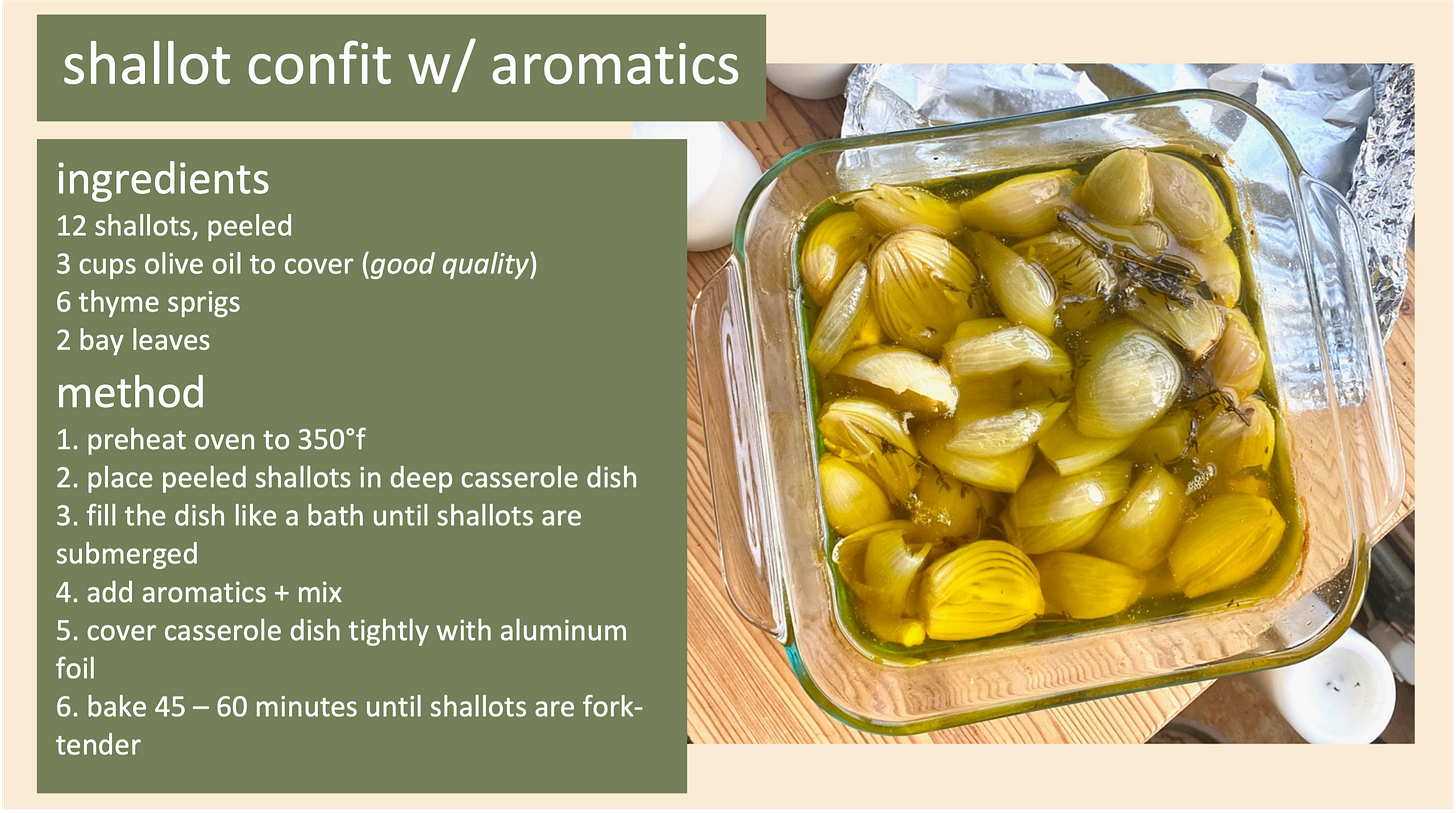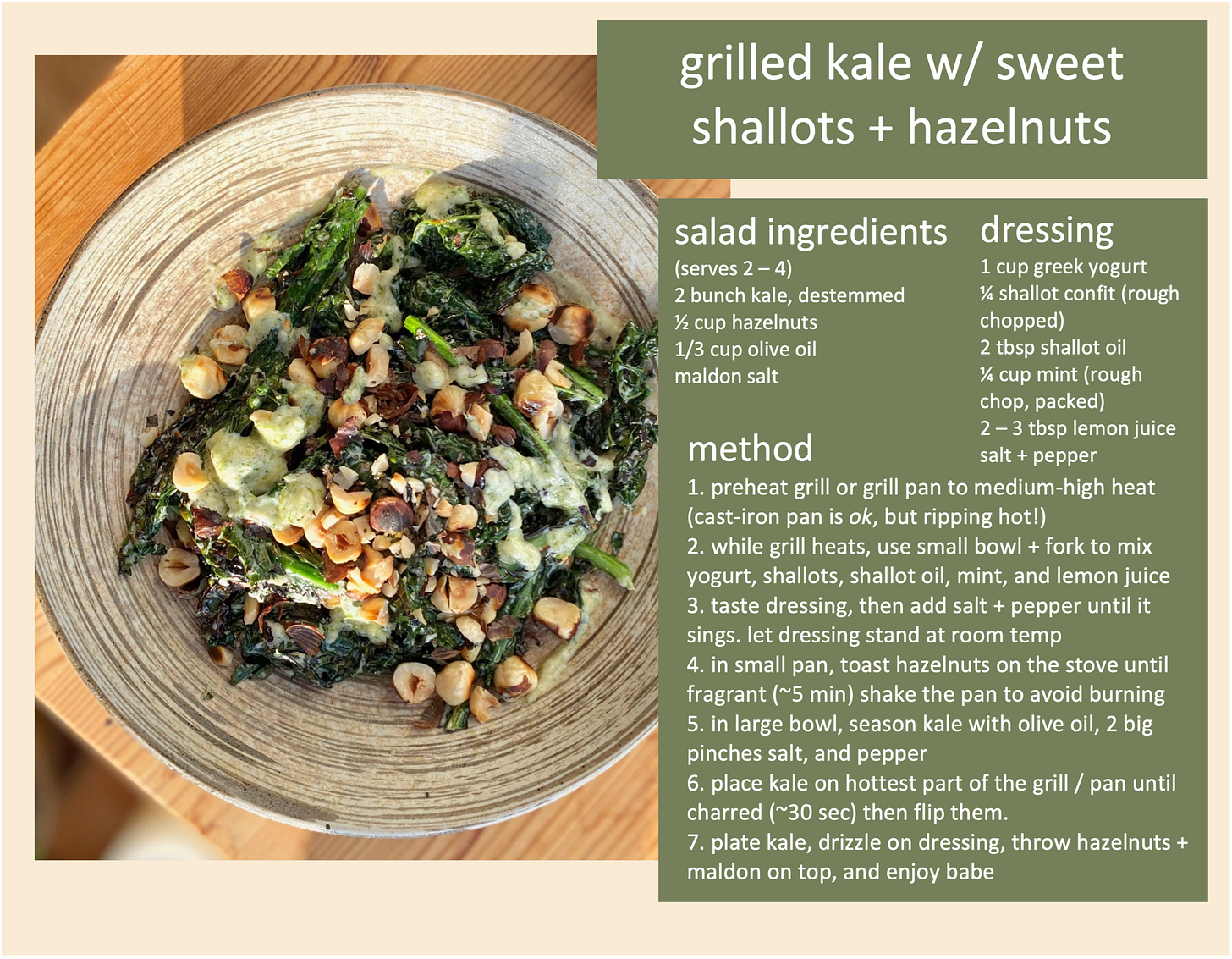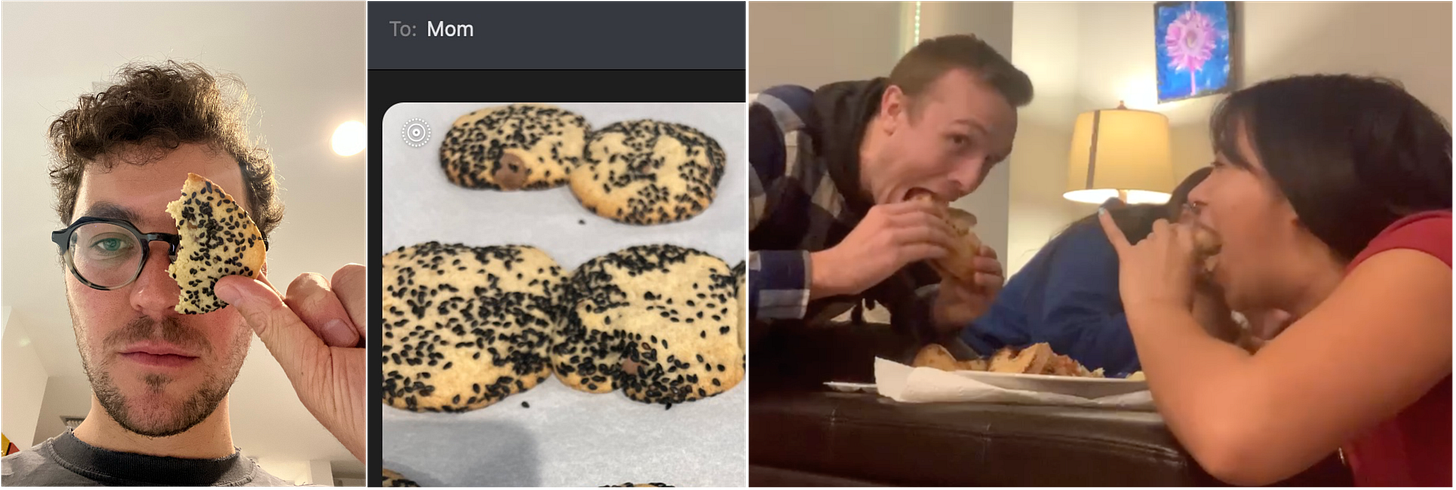eat with your ears newsletter is a table of strangers and strange ideas linked together through quality food and music. thank’s for joining me at dinner.
incase you missed february, don’t worry i never wrote it, march is just february’s tomorrow and sometimes a writer just needs a day to rest.
amuse buche
how to be a poet (to remind myself) - wendell berry
accept what comes from silence.
make the best you can of it.
of the little words that come
out of the silence, like prayers
prayed back to the one who prays,
make a poem that does not disturb
the silence from which it came.
“culture is usually thought of as something created, maintained, and developed by humanity’s efforts alone. but culture always originates in the partnership of main and nature… something born from human pride and the quest for pleasure cannot be considered true culture. true culture is born within nature, and is simple, humble, and pure… food is life, and life must not step away from nature.”
— masanobu fukuoka, one straw revolution
what’s cooking?
devoted to foods i ate this month that i wish i shared with all of you. the what’s cooking column simulates a meal across space and time. the future is now, i’m emailing you flavor [some assembly required]
good cooking is troublesome— it takes time. a meal’s preparation can be spread out over many many days (and many tupperware). with a fridge full of complex, time-built ingredients the cook can effortlessly assemble flavor foundations into divine—yet quick—meals in minutes.
shallots are the ruthless mistress of the palate: they demand attention when treated poorly. when raw, they claw for attention… but just below the skin lies a hidden sweetness that only patience can coax to the surface. mistreated, they bite through the tongue in an over-indulgent oyster mignonette. they bring cooks to tears with oppressive perfumes released under the blade. with time however— and a bath of olive oil— shallots reveal a secret tenderness. no one believes an object of desire can be sweet, but some shall(ots) have it all.
with a slow, steady roast in olive oil (confit) a shallot is cooked from the inside out until they begin to caramelize evenly without break down or browning. only there, the deep floral flavor of the allium intensifies yet softens on the tongue. crunchy erodes to creamy and the shallots sharp snare melts into
spread these creamy shallots like butter on toasted bread then top with egg, feta, chili flakes! mince shallots with parsley, capers, anchovies, and red wine vinegar to for a rich, fresh salsa verde to glorify a seared steak in. better yet, blend the rich, oily shallots into the foundations of a unappreciated salad.
salads too often fall shy of their infinite potential. too often, fresh greens are overlooked when forced to frame some big, charred, bleeding main dish of dead animal. too often, the endless bounty that miraculously sprung from the earth remains untouched, underdressed. the life of a leaf deserves a eulogy fit for the life of a cow—or at least it’s tenderloin.
and so, embrace patience the next time you build a kale salad. offer kale to the flames as you would your livestock. wed the charred leaf’s crunch to the smoothness of a shallot confit dressing. layer the bitter green with fiery blacks edges! coat them milky, zested dressing. build a salad worthy of solitude— then top it with sweet toasted hazelnuts. vegetables don’t reveal their depths with the simplicity of salt and a flame, but with thoughtful pairings, a cook can serve the leaf’s life the death it deserves.
a kale salad always means winter is here— but toss it on the grill and suddenly it becomes a harbinger of the produce of spring!
shoutout to the friends who dined with me last month. share a photo if you endulge in any of these recipes at home!
leftovers
at first thought, an uppercase “I” seems terribly rude. it’s self-important to treat a identifying pronoun like a proper noun: “I” gets crowned with a capital, it’s just as regal as “Charlemagne” while “you” and “they” are subjugated to lower class serifdom. on second thought, if individualism promotes “I” into the capital class, then why don’t we capitalize “Me” … or “We” … or at least the “I” part of we. the word “we” joins the self with a companion, so should we double capitalize it? should We double the font size? (newsletters don’t allow font size changes so imagine that bold W is humongous. font jokes?! funny!) on third thought, the beginnings of sentences also get capitals as if the period wasn’t doing its only job well enough. how does the period feels about that!?
the rules of grammar are pretty silly if you pause to think about them…. on second thought, the letters of the alphabet are pretty silly too if you think about them too. little lines and squiggles make up shapes that represent sounds, but store no meaning by themselves. i recently read that egyptian hieroglyphs represented phonetic sounds and symbolic meanings at the same time: a pictogram of an eye represented the sound “i” and the idea of a human eye. egyptians had no capitalization, just pictures of wingdings, and neither did the semetic alphabet that soon took its place.
the semetic alphabet, which later evolved into the 26 letter english alphabet, was developed near egypt between 1800 – 1900 b.c. it was the first purely phonetic alphabet of consonant sounds meaning that each symbol represented a sound, but no physical meaning. semetic script was purely uppercase—or majuscule. it remained unchanged as it propagated around the mediterranean via strade routesof the phoenician people until the greeks appended vowels and the alphabet grew. by 300 a.d., the time’s newly empowered romans spread the alphabet—renamed as latin—across europe but every written word remained majuscule: in ancient rome, “I” am just as important as “YOU.” (hehe more font jokes)
at the time, only educated scribes knew how to write and they did so in an old roman cursive script called “uncial” (lot of great trivia here for my crossword friends). uncial had no lowercase letters and no punctuation—it was just a stream of majuscule characters. the characters were rigid and angular restricted by the rigid texture of stone tablets and fibrous papyrus scrolls. parchment paper changed everything changed. It’s silky texture freed calligraphers from scripting in time consuming linear fonts and enabled smaller, curvier shapes. the uncial script evolved to include miniscule abbreviated letters that enabled scribes to more efficiently copy their . the new alphabet was majuscule and miniscule but there were no rules for how to use each. for a time, scribes commonly wrote purely in miniscule script scarcely using majuscule to EMPHASIZE worlds like God or King, but no rules were absolute.
it turns out that capitalizing “I” in English has nothing to do with inflated ego. in old English, the word “I” didn’t even exist—it was written as “ich” or “ic.” when english evolved into to middle-english (think canterbury tales era), scribes shortened ic / ich even further to but “I” remained lowercase for some time. the capitalization of “i” began in the 13th century. it was not to indicate importance, but to avoid graphical misreadings.
some font historians, like charles bigelow (the inventor of the wingding font) hypothesize “that an i all by itself would have become illegible after multiple handlings and readings of a manuscript, and scribes had to make the pronoun graphically sturdier to stand the tests of time and smudging hands.” additionally, there are only two one-letter-words in english: “i” and “a.” font historians believe that the concept of self was too grand to be represented with a one letter word even if it was faster to write.
the uppercase “I” of english was a graphic transition born out of necessity that caused cultural ripples across the english speaker world. in german, nouns are capitalized, but never pronouns: “i” is the same as “you”. in chinese and japanese scripts, capitalization doesn’t even exist. luckily, i’m not alone in this outlandish extrapolation: a group of psychologists developed the sapir-whorf hypothesis that agues language holds the power to shape our reality. Specifically, the language one speaks, writes, and reads influence’s restricts one’s thought processes and therefore it shapes the way we think about and perceive the world. did the capitalization of the word “I” in middle english trigger a culture-wide ego inflation that began individualism, competition-capitalism, and industrialization? probably not!
whorf did howerver investigate his hypothesis among native american speakers of the hopi language. hopi has no present, past, or future tense; instead, they divide the world into manifested and unmanifest domains. no words exist for seconds, minutes, or days of the week thus time as we know it in english is incomprehensible. a hopi gathering starts when it starts (manifest reality) and it lasts until it is over (unmanifest reality). similarly, the language of the pottawattamie people uses animate indicators for every part of the natural world: trees are considered “them” but never an “it.” pottawattamie speaker and acclaimed botanist robbin wall kimmerer notes “it is impossible in our language to speak of other living beings as “it”s… thinking about plants as persons, indeed, thinking about rocks as persons, forces us to shed our idea of the only pace that we live in is the human pace. it’s, i think, very, very exciting to think about these ways of being which happen on completely different scales.”
english, as with any language, has walls. in every sentence, every word, every letter, there’s a design, a mistake, an evolution, a history, a limit. the prison walls on language must first be seen to be broken. melted down, forged, beaten, reshaped into something new. it’s silly to think of a world without a capital word but playful questions often lead to
the deepest answers. does the moon fall just like an apple falls? – newton. does light have a speed? – einstein. why was poetry only written for kings? – t.s. eliot
life exists beyond language, but poetry wields the confines of language to exist beyond life.
to close, a conversation within and without oneself by e.e. cummings— a poet who knew no “I”
i carry your heart with me(i carry it in
my heart)i am never without it(anywhere
i go you go,my dear;and whatever is done
by only me is your doing,my darling)
i fear
no fate(for you are my fate,my sweet)i want
no world(for beautiful you are my world,my true)
and it’s you are whatever a moon has always meant
and whatever a sun will always sing is you
here is the deepest secret nobody knows
(here is the root of the root and the bud of the bud
and the sky of the sky of a tree called life;which grows
higher than soul can hope or mind can hide)
and this is the wonder that's keeping the stars apart
i carry your heart(i carry it in my heart)
—e.e. cummings
frozen dessert
i’m months behind for 2021 wrap ups, but sometimes dessert needs to be frozen for indulgence at a later time.
album: leon vynehall - rare forever
birth, growth, death, rebirth. a snake sheds it’s skin, eats it’s own tail. rare forever is a twisted and shimmering descent into the synthetic psychology of UK producer leon vynehall. the lush, organic sound design transports listeners to a post-apocolyptic future where—instead of nihilistic numbness—they find the unrelenting emotional arc of one musician’s experience. minimalist jazz, peak-time club tunes, distorted poetry, and euphoric crescendos are sewn together with wires in a way that seems almost too human for electronic instruments to create.
song: yung lean - agony
i rekindled my love for swedish cloud rapper and underground icon yung lean this year after hearing agony shine through. in an apathetic tone of depression, lean sings “when i’m afraid i lose my mind, it’s fine it happens all the time… isolation caved in, i adore you, the sound of your skin.” a haunting beauty far predating the pandemic’s solitude of self-isolation and lonely longing for love. once in a while i miss lockdown, did you forget how it felt to be alone in a room full of people too?
chef: nick curtola - four horsemen
brooklyn natural wine bar serving italian-leaning new american plates designed by chef nick curtola. it’s elegant yet casual, minimalist yet approachable. the michelin starred neighborhood staple struck my articulately last year that i had to learn how to make it: i’m their newest prep! oh, and it’s owned by james murphy of lcd soundsystem which is somehow an afterthought.
movie: mike mills - c’mon c’mon
adults know more than children, but children hold wisdom that erodes with the accumulation of knowledge. in c’mon c’mon, a nine year old is given the vocabulary to vocalize the intensity of feeling emotions for the first time to his babysitting uncle—the ecstasy of being alive, the crippling confusion, the density of it all happening at once. this dialogue driven movie tenderly holds the richness of everyday life that is so often overlooked. it made me want to turn off the tv, go into the world, and shamelessly be the messy human i am.
book: min jin lee - pachinko
“we cannot help but be interested in the stories of people that history pushes aside so thoughtlessly.” in a multi-generational saga spanning a family’s emigration from korea to japan, korean-american author min jin lee explores the unspeakable dialogues parents share through bloodline and the food they feed their families. elegant, unraveling, and unrelentingly meaningful, pachinko floats off the page as if they belonged more to reality than a novel.





